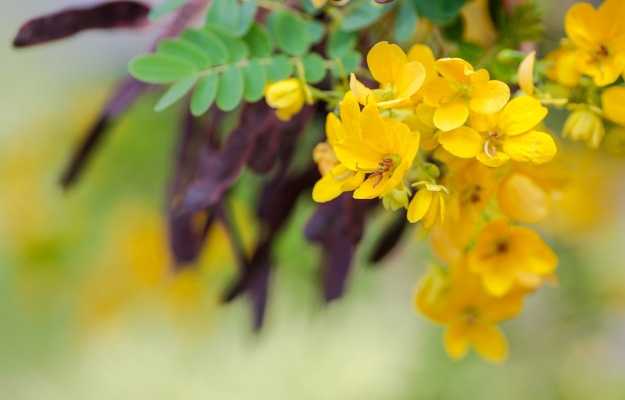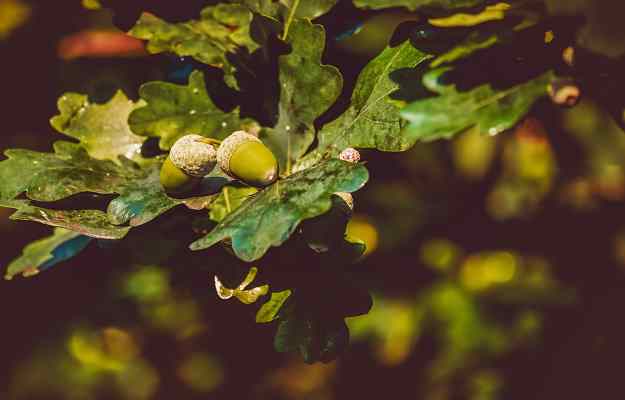Senna is a flowering genus of the legume family (which includes all our dals, beans, peas and peanuts). With over 50 species in cultivation, the Senna medicinal plants are known and used globally. There are even more species that grow in the wild—close to 350 by one estimate.
Basic information about Senna:
- Scientific name: There are several Senna plants in use across the world. For the purpose of this article, we are looking at the benefits and side-effects of four Senna plants with proven medicinal uses. These are:
- Cassia angustifolia: Tinnevelly senna or Indian senna
- Cassia alexandrina: Senna alexandrina
- Senna tora
- Cassia occidentalis
- Family: Fabaceae
- Common names: Senna, nila avurai, avuri, markandika, senai
- Sanskrit names: Swarnapatri
- Parts used: Leaves, pods, flowers
- Geographical distribution: This drought-resistant plant is grown in many parts of India. It also grows all around the world, especially in North Africa.
- Interesting fact: Senna is part of the World Health Organization’s Model List of Essential Medicines 2019, as a laxative and for palliative care.
Senna plants contain plant chemicals (phytochemicals) called anthraquinones (including aloe-emodin) and sennosides which make it an effective laxative that can be used in conditions like constipation. It may also be used to fight certain infections. Read on to know more:
Health benefits of senna
Though mostly used as a laxative for constipation and bowel prep before a colonoscopy, senna also has some other uses in traditional and folk medicine. Research shows that while the bowel cleansing properties of senna can be attributed to sennosides in senna, the antimicrobial properties come from plant chemicals called anthraquinones. Read on to know more about the medicinal uses of senna.
Senna laxative properties
Senna has been approved by the US Food and Drug Administration (US FDA) as an over-the-counter laxative, including in conditions like constipation in children aged two and above.
A stimulant laxative, Senna works by increasing gut motility—the squeezing action of the intestines to move food and waste along, known as peristalsis—and water secretion into the intestinal tract for easier passage of stools. The leaves and flowers of the plant contain phytochemicals known as sennosides which are responsible for this action.
Because Senna can clear the bowel, it may sometimes be used along with other agents like sodium picosulfate and polyethylene glycol ahead of a colonoscopy (a diagnostic test in which the doctor uses a catheter and small camera to see inside the large intestine or colon).
Some Ayurvedic remedies for hernia also contain senna, to promote proper evacuation of the bowels, for a senna bowel cleanse.
Remember that long-term use of Senna—especially in higher doses—has side effects. Talk to your doctor about the proper dosage and usage for you, if you want to use Senna.
Senna for chronic constipation
A small double-blind, placebo-controlled study with 93% female participants found that Senna extract was as good as magnesium oxide for the treatment of chronic constipation. Additionally, senna extract and magnesium oxide both helped in achieving complete spontaneous bowel movement (or satisfactory and easy bowel movement) and better quality of life for patients, according to this study.
Senna for liver problems
Whereas an animal study has shown that a methanol extract of Cassia angustifolia may reduce oxidative stress on the liver, increase the amount of good cholesterol (HDL), reduce the amount of bad cholesterol (LDL) and triglycerides and even prevent lesions on the liver, other researchers have found that long-term use of senna tea may cause liver damage.
Having said that, a variety of senna, called Cassia occidentalis, is one of the ingredients in a popular Ayurvedic medicine for liver diseases like liver cirrhosis caused by alcoholism.
If you are considering taking senna for liver health, consult your doctor first and make sure to ask about the correct dosage for you.
Senna for infections
Research shows that the seeds of Senna tora plant can make anthraquinones. And anthraquinones have been found to be helpful in the treatment of:
- Viral infections like hepatitis B—anthraquinones are said to disrupt the production of an enzyme that is important for the replication (and, therefore, survival) of the virus.
- Herpes infection: Further, research has shown that antiviral properties of anthraquinones could be used in the treatment of herpes infections including cold sores and genital herpes.
- Cervical cancer: 70% of all cervical cancer cases are caused by human papillomavirus (HPV) 16 or HPV 18 infection. Research has shown that senna may be useful against these viruses, too. More research needs to be done to confirm this benefit in humans, though.
- Drug-resistant infections: The researchers are also hopeful that this plant chemical could be useful in the treatment of certain drug-resistant infections.
- Fungal infections: Research has also shown that anthraquinones can fight common fungal infections caused by C. Albicans fungus.
- Bacterial infections: According to research published in the peer-reviewed journal BMC Complementary and Alternative Medicine, Cassia angustifolia (Indian Senna) extracts “have the potential to inhibit microbial growth of E. cloacae, P. aeruginosa, S. mercescens and S. typhi.” These are the bacteria that can cause:
- E. cloacae: Urinary tract infections and respiratory infections
- P. aeruginosa: Pseudomonas infection (a major risk factor for pneumonia)
- S. marcescens: Respiratory infections, endocarditis (heart), osteomyelitis (bone infection), septicemia (blood infection), wound infections, eye infections and meningitis (infection in the meninges layer of the brain).
- S. typhi: Typhoid fever
Anti-cancer properties of Senna
Scientists found three types of flavonoids in Indian senna or Cassia angustifolia which may inhibit the growth of cancer cells. These flavonoids (plant chemicals with strong antioxidant properties) are:
- Quercimeritrin
- Scutellarein
- Rutin
Senna for weight loss
Senna is one of many herbs used for weight loss in traditional Chinese medicine. According to one study, these herbs work by inhibiting fatty acid synthase. However, this study was done with animals in a lab. Talk to your doctor before taking Senna for weight loss or detox.
Are you also troubled by obesity and are not able to lose weight even after a lot of efforts, then start using myUpchar Ayurveda Medarodh Weight Control Tablet today and control your weight.
Senna dosage and how to use
While your doctor will be the best person to advise on the correct usage and dosage of Senna for your particular health problem, here’s what the WHO list of essential medicines says:
- As a laxative: 7.5 mg tablets containing sennosides (Senna plant chemicals) or traditional forms of the medicine
- For palliative care: liquid medication with 7.5 mg of Senna extracts in 5mL of liquid, to be given orally.
It is important to discuss the duration of treatment with your doctor, as long-term use can have side effects. The National Health Service of the UK recommends limiting the duration to under one week.
The use of Senna may be contraindicated in some conditions, including
- Pregnancy, including if you are trying to conceive
- Breastfeeding moms
- Ulcerative colitis: Medical practitioners report that if someone with irritable bowel syndrome, whether it is in the form of ulcerative colitis or Crohn's disease, takes senna for a prolonged period, they are more likely to experience side effects like stomach cramps.
- Crohn’s disease
- Bowel obstruction
- If you are taking certain medications like diuretics, steroids or heart disease medicine like quinidine or digoxin
Senna side effects
Like other stimulant laxatives, Senna—especially Senna leaves—can be strong and lead to side effects like diarrhoea and abdominal cramps. Researchers have also found evidence—though this is rare—of perineal blistering in children who are given Senna for constipation. The reason for this, according to experts, could be night-time accidents where the children pass stool in bed and it stays in contact with their skin for a long time. The perineum is the region between the anus and the scrotum/vulva. This side effect was more common in people who took Senna in larger doses of 60 mg per day compared with 17.5 mg a day, according to the researchers.So even though Senna is approved in the US for short-term, non-prescriptive treatment of constipation, long-term use is not advised.
Additionally, though constipation during pregnancy is a very common problem, experts caution against the use of senna during pregnancy and breastfeeding as some of it can get absorbed in the gut.
Experts say continuous use of Senna may result in problems with the bowel functioning properly on its own afterwards.
Case studies are not exactly indicative of what could happen to all patients, but they are important for medical professionals and researchers to look into potential problems. In that spirit, here’s what one case study found: researchers were able to link indiscriminate use of herbal medicines including Senna with paralytic ileum or problems with the nerves and muscles of the gut that prevent bowel movements. This was, of course, one case study, and more research needs to be done on any connection between the use of Senna for chronic constipation and paralytic ileus.
Rarely, the use of Senna may also cause a raised, itchy skin rash in some people. If this happens, discontinue use and talk to your doctor.
Some Senna extract tablets may also turn the urine a reddish-brown colour but this is temporary and nothing to worry about.
Find Naturopathy Doctor in cities
Doctors for Senna benefits and side effects

Dr. Reena Mudiya
Naturopathy
5 Years of Experience

Dr. Ekta Gupta
Naturopathy
5 Years of Experience
Medicines / Products that contain Indian Senna
- Myupchar Ayurveda Brihat Manjisthadi Churna Tablet - ₹719
- Aayuheal Nimorab 20+ Ointment - ₹389
- Yukti Herbs Roz Out Powder 125gm - ₹250
- Dabur Nature Care Isabgol Powder 100gm - ₹162
- Jairishi Colon Clear Tablet - ₹306
- Dabur Laxirid Syrup - ₹162
- Kerala Ayurveda Laxinol-H Capsules - ₹499
- Butterfly Ayurveda Colonofly Syrup - ₹150
- Anju Sugam Churn Small Pack - ₹40
- Cureado Stemphyles Tablet - ₹895
- Namhya Diabetes care tea - ₹589
- Baidyanath Nagpur Panchsakar Churna 50gm - ₹72
- HASS Sukhdata-Tonic of life 80gm - ₹142
- Anju Alive Syrup Large Pack - ₹180
- Virgo Healthcare Trilax, Powder for Constipation Relief (100gm) - ₹250
- Yukti Herbs Roz Out Powder 250gm - ₹450
- Softovac SF Bowel Regulator Powder - ₹161
- Baidyanath Haritaki Khand - ₹98
- Cipzer Sharbat Murakkab Musaffi Khoon 200 ml - ₹449
- Aayucure Wylex Tablet - ₹350
- Planet Ayurveda Panchsakar Churna - ₹380
- Softolax Powder Saunf - ₹193
- Baidyanath Nagpur Panchsakar Churna 100gm - ₹127
- Unjha Niyam Churna - ₹117
- Aimil Pulvolax Granules - ₹206
- Planet Ayurveda Swadisht Virechan Churna - ₹380
- Baidyanath Surakta Syrup 100ml - ₹97
- Softovac SF Bowel Regulator Powder Sugar Free - ₹460
- Zenius Stomach 3in Powder 100gm - ₹549
- Riddhish Herbals Sonamukhi Powder (Pack of 3) 100gm - ₹195
- Vaidyamrit Vaidyadiet Powder 150gm - ₹260
- Baidyanath Surakta Syrup 200ml - ₹97
- Ayuugain Happy Tummy Capsule for Constipation Relief (60) - ₹405
- Dabur Janma Ghunti 60ml - ₹41
- Baidyanath Panchsakar Churna 100gm - ₹119
- Baidyanath Sarivadyarishta - ₹188
- Dabur Panchsakar Churna - ₹70
- Baidyanath Panchsakar Churna 50gm - ₹64
- Baidyanath Kabja Har 100gm - ₹89
- Sewa Subah Fresh Churna 100gm - ₹125
- Planet Ayurveda Senna Powder - ₹500
- Planet Ayurveda Kabaj Mukti Capsule - ₹1450
- Cipzer Itrifal Sanai 125 gm - ₹449
- Cipzer Lauq Sapistan Khayar Shambari 125 gm - ₹449
- Aryan Shakti Detox Natural Drops - ₹250
- HASS Sukhdata-Tonic of life 480gm - ₹775
- Cipzer Itrifal Shahtra 125 gm - ₹449
- Anju Sugam Churn Frequent User Pack - ₹75
- Zaarah Senna Leaves 70gm - ₹221
- A&A Ayurvedic Flush On Granules (Pack of 4) - ₹161
References
- World Health Organization, Geneva [Internet]. World Health Organization Model List of Essential Medicines, 21st list, 2019. Licence: CC BY-NC-SA 3.0 IGO.
- G. Sathiyabalan, T. Venkata Rathina Kumar, Bhuvaneshwari Santharam and P. Senniappan. Farmers facing problems and commercial opportunities of Tinnevelly Senna in India. European Journal of Pharmaceutical and Medical Research, 2019; 6(9): 586-9.
- Vilanova-Sanchez A., Gasior A.C., Toocheck N. and Weaver L. et al. Are Senna based laxatives safe when used as long term treatment for constipation in children? Journal of Pediatric Surgery, 2018; 53(4): 722-7. https://doi.org/10.1016/j.jpedsurg.2018.01.002
- Morishita D., Tomita T., Mori S., Kimura T., Oshima T., Fukui H. and Miwa H. Senna versus magnesium oxide for the treatment of chronic constipation: A randomized, placebo-controlled trial. The American Journal of Gastroenterology, September 2020. doi: 10.14309/ajg.0000000000000942. Epub ahead of print. PMID: 32969946.
- Parvez M.K., Al-Dosari M.S., Alam P., Rehman M., Alajmi M.F. and Alqahtani A.S. The anti-hepatitis B virus therapeutic potential of anthraquinones derived from Aloe vera. Phytotherapy Research. November 2019; 33(11): 2960-70. doi: 10.1002/ptr.6471. Epub 2019 Aug 13. PMID: 31410907.
- World Health Organization, Geneva [Internet]. Human papillomavirus (HPV) and cervical cancer, 11 November 2020.
- World Health Organization, Geneva [Internet]. Human papillomavirus (HPV) and cervical cancer, 11 November 2020.
- World Health Organization, Geneva [Internet]. Human papillomavirus (HPV) and cervical cancer, 11 November 2020.
- Roa-Linares V.C., Miranda-Brand Y., Tangarife-Castaño V., Ochoa R., García P.A., Castro M.Á., Betancur-Galvis L. and San Feliciano A. Anti-herpetic, anti-dengue and antineoplastic activities of simple and heterocycle-fused derivatives of terpenyl-1,4-naphthoquinone and 1,4-anthraquinone. Molecules, 2 April 2019; 24(7): 1279. doi: 10.3390/molecules24071279. PMID: 30986933.
- Manoharan R.K., Lee J.H., Kim Y.G. and Lee J. Alizarin and chrysazin inhibit biofilm and hyphal formation by Candida albicans. Frontiers in Cellular and Infection Microbiology, 16 October 2017; 7: 447. doi: 10.3389/fcimb.2017.00447. PMID: 29085811.
- Ahmed S.I., Hayat M.Q., Tahir M., Mansoor Q., Ismail M., Keck K. and Bates R.B. Pharmacologically active flavonoids from the anticancer, antioxidant and antimicrobial extracts of Cassia angustifolia Vahl. BMC Complementary and Alternative Medicine, 11 November 2016; 16(1): 460. doi: 10.1186/s12906-016-1443-z. PMID: 27835979.
- Watson R. and Preedy V (Ed.). Dietary interventions in liver disease: foods, nutrients, and dietary supplements, 1st edition, Academic Press: p20. Published: 16 January 2019.
- Wei-Xi Tian, Li-Chun Li, Xiao-Dong Wu and Chuan-Chu Chen. Weight reduction by Chinese medicinal herbs may be related to inhibition of fatty acid synthase. Life Sciences, 2004; 74(19): 2389-99. https://doi.org/10.1016/j.lfs.2003.09.064.
- National Health Service [Internet]. UK; Senna
- Sossai P., Nasone C. and Cantalamessa F. Are herbs always good for you? A case of paralytic ileum using a herbal tisane. Phytotherapy Research, June 2007; 21(6): 587-8. doi: 10.1002/ptr.2099. PMID: 17397118.













